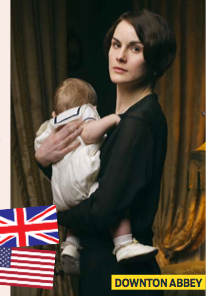Monday, January 13, 2014
Big TV Mysteries, Answered
(from the Jan. 6 edition of TV Guide Magazine)
By Stephen Battaglio and Michael Schneider
The TV viewing experience gets more complicated all the time. That’s why we asked you to submit questions on Facebook about the intricacies and inanities of the TV industry. Here are the answers to the five most common queries.
Why can’t the broadcast networks produce cutting-edge shows like The Walking Dead?
“That’s a bit of a crock,” says one network executive. “Scandal, The Good Wife and The Blacklist could easily be great cable shows, and people would say, ‘Why doesn’t broadcast do that?’” But it’s also true that, beyond a handful of shows like AMC’s The Walking Dead and FX’s Sons of Anarchy (both of which post broadcast-size ratings), most of cable’s critical darlings still reach a niche audience much smaller than the big crowds broadcast TV requires. That’s especially the case early in a show’s run. “Breaking Bad would have been canceled for lack of audience after its first year if it was on broadcast,” the exec notes.
When does the law to bring down the volume on commercials take effect?
It already has! The Commercial Advertisement Loudness Mitigation (CALM) Act began on December 13, 2012. The FCC rule requires TV commercials to have the same average volume level as the programs on which they appear. The FCC is relying on viewers to help enforce the rule, so if you think a broadcast or cable channel is in violation you can file a complaint electronically at fcc.gov/complaints. Click on the “Loud Commercials” button and you’ll be directed to the form.
Why does Downton Abbey air so many months later here than in the U.K.?
The delay between the U.K. airings in the fall and the American premiere in January helps generate interest in the show and proves to be a ratings boon, according to PBS president Paula Kerger. “We look at how we can get promotion and buzz around the series, and the fact that people talk about it and that word of mouth travels once it premieres in the U.K. has benefited us,” she has said. The numbers back her up. Downton Abbey is the highest-rated drama series in the history of public television, with 12.3 million viewers watching the Season 3 finale last February. In the age of binge-watching, asking viewers to keep a lid on spoilers no longer seems like a big risk.
Why can’t I just subscribe to the cable networks I watch?
Sen. John McCain has pushed legislation that would give consumers the opportunity to buy channels on an à la carte basis. But only paying for the networks you watch doesn’t mean your cable bill will be lower. When large media companies negotiate with cable operators to carry their channels, they demand that their lesser-known channels be included in a package with the popular ones. If the cable operators refuse to carry those smaller networks, the owners simply charge higher carriage fees for their more widely viewed channels—and that cost would be passed on to subscribers. An investment bank recently determined that cable subscribers would pay $20 to $30 a month for ESPN if it were offered on a stand-alone basis instead of as part of a bundle. The best way to lower your cable bill is to call your local operator and say you want to cancel your service. There’s a good chance you can cut a deal to pay less.
How is Ryan Seacrest able to work for so many networks?
Despite his stature as the last remaining original star of American Idol, which made him a household name, Ryan Seacrest isn’t beholden to Fox. Last summer, he hosted NBC’s The Million Second Quiz. He’s in Times Square every year to emcee ABC’s Dick Clark’s New Year’s Rockin’ Eve With Ryan Seacrest. Until recently, he anchored E!’s E! News Daily. (He’s also a producer of several shows, including Keeping Up With the Kardashians and Shahs of Sunset.) Doesn’t Fox have any exclusivity on Seacrest’s services? The network does—sort of. Under the terms of his $15 million-a-year deal, Seacrest can’t host another show that would be considered a competitor to Idol (in other words, your job on The Voice is safe, Carson Daly). But that means any other type of show is fair game. And workaholic Seacrest seems willing to test the limits of how many employers one TV star can have.
Labels:
ABC,
AMC,
American Idol,
Cable TV,
Downton Abbey,
Fox,
Ryan Seacrest,
The Walking Dead,
TV,
TV Guide
Subscribe to:
Post Comments (Atom)





No comments:
Post a Comment